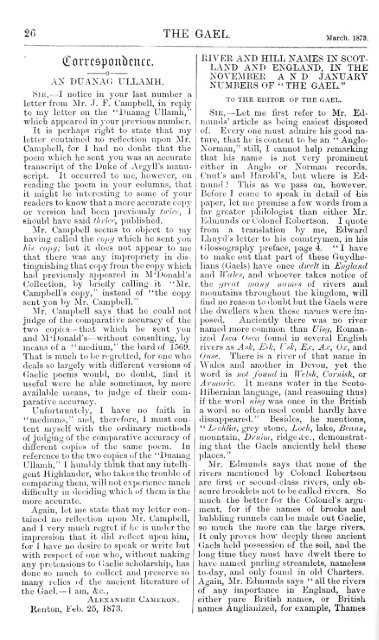You also want an ePaper? Increase the reach of your titles
YUMPU automatically turns print PDFs into web optimized ePapers that Google loves.
26 THE GAEL. March. 1873.^^crrrcsjjonlicncc.AN DUANAG ULLAMH.SiK,— I notice in your last number aletter from Mr. J. F. Campbell, in rejjlyto my letter on the "Duanag Ullamli,"which appeared in your previous number.It is jierhaps right to state that myletter contained no reflection upon Mr.Carajjbell, for I had no doubt that thepoem which he sent you was an accuratetranscript <strong>of</strong> the Duke <strong>of</strong> Argyll's manuscript.It occurred to me, however, onreading the poem in your columns, thatit might l;e interesting to some <strong>of</strong> yourreaders to know that a more accurate copyor version had been previously twice, Ishould have said thric, published.Mr. Campbell seems to object to myhaving called the cojiij which he sent youhis copy; but it does not appear to methat there was any impropriety in distinguishingthat copy from the copy whichhad previously appeared in M 'Donald'sCollection, by briefly calling it "Mr.Campbell's copy," instead <strong>of</strong> "the copysent you by Mr. Campbell."Mr. Campbell says that he could notjudge <strong>of</strong> the comparative accuracy <strong>of</strong> thetwo copies—that which he sent youand M 'Donald's—without consulting, bymeans <strong>of</strong> a "medium," the bard <strong>of</strong> 1569.That is much to be regretted, for one whodeals so largely with difierent versions <strong>of</strong>Gaelic poems would, no doubt, find ituseful were he able sometimes, by moreavailable means, to judge <strong>of</strong> their comparativeaccuracy.Unfortunately, I have no faith in"mediums," and, therefore, I must contentmyself with the ordinary methods<strong>of</strong> judging <strong>of</strong> the comparative accuracy <strong>of</strong>different copies <strong>of</strong> the same poem. In ing that the Gaels anciently held thesereference to the two copies <strong>of</strong> the 'Duanag'places."UUamh," I humbly think that any intelligentMr. Edmunds says that none <strong>of</strong> theHighlander, who takes the trouble <strong>of</strong> rivers mentioned by Colonel Robertsoncomparing them, will not experience much are first or second-class rivers, only obscuredifficulty in deciding which <strong>of</strong> them is thebrooklets not to be called rivers. Somore accurate.much the better for the Colonel's argument,Again, let me state that my letter containedfor if the names <strong>of</strong> brooks andno reflection upon Mr. Campbell,and I very much regret if he is under thebubbling runnels can be made out Gaelic,so much the more can the large rivers.impression that it did reflect upon him,for I have no desire to speak or write butwith respect <strong>of</strong> one who, without makingany pretensions to Gaelic scholarship, hasdone so much to collect and preserve somany relics <strong>of</strong> the ancient literature <strong>of</strong>the Gael.— I am, &c.,Alexander Cameron.Renton, Feb. 25, 1873.EIVER AND HILL NAMES IN SCOT-LAND AND ENGLAND, IN THENOVEMBER AND JANUARYNUMBERS OF "THE GAEL."TO THE EDITOR OF THE GAEL.Sir, —Let me first refer to Mr. Edmunds'article as being easiest disposed<strong>of</strong>. Every one must admire his good nature,that he is content to be an " <strong>An</strong>glo-Norman," still, I cannot help remarkingthat his name is not very prominenteither in <strong>An</strong>glo or Norman records.Cnut's and Harold's, but where is Edmund? This as we pass on, however.Before I come to sjjeak in detail <strong>of</strong> hisl^aper, let me premise a few words from afar greater philologist than either Mr.Edmunds or Colonel Robertson. I cpiotefrom a translation by me, EdwardLhuyd's letter to his countrymen, in hisGlossography preface, page 4. "I haveto make out that part <strong>of</strong> these Guydhelians(Gaels) have once dwelt in Englandand Wales, and whoever takes notice <strong>of</strong>the (jrent many names <strong>of</strong> I'ivers andmountains throughout the kingdom, willfind no reason to doubt but the Gaels werethe dwellers when these names were iml^osed.<strong>An</strong>ciently there was no rivernamed more common than Uisg, RomanizedIsca Osca found in several Englishrivers as Ask, Esk, Usl; Ex, Ax, Ux, andOuse. There is a river <strong>of</strong> that name inWales and another in Devon, yet theword is iiot found in Welsh, Coi-nish, orArmoric. It means water in the Scoto-Hibernian language, (and reasoning thus)if the word uisg was once in the Britisha word so <strong>of</strong>ten used could hardly havedissappeared. " Besides, he mentions," Lec/dia, grey stone. Loch, lake, Beann,mountain, Druim, ridge J;c., demonstrat-It only proves how deeply these ancientGaels held possession <strong>of</strong> the soil, and thelong time they must have dwelt there tohave named purling streamlets, namelessto-day, and only found in old Charters.Again, Mr. Edmunds says " all the rivers<strong>of</strong> any importance in England, haveeither pure British names, or Britishnames <strong>An</strong>giianized, for example, Thames

















